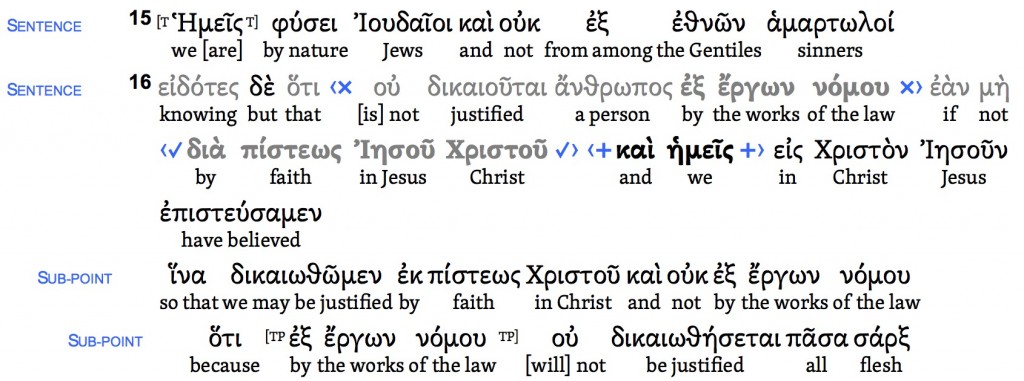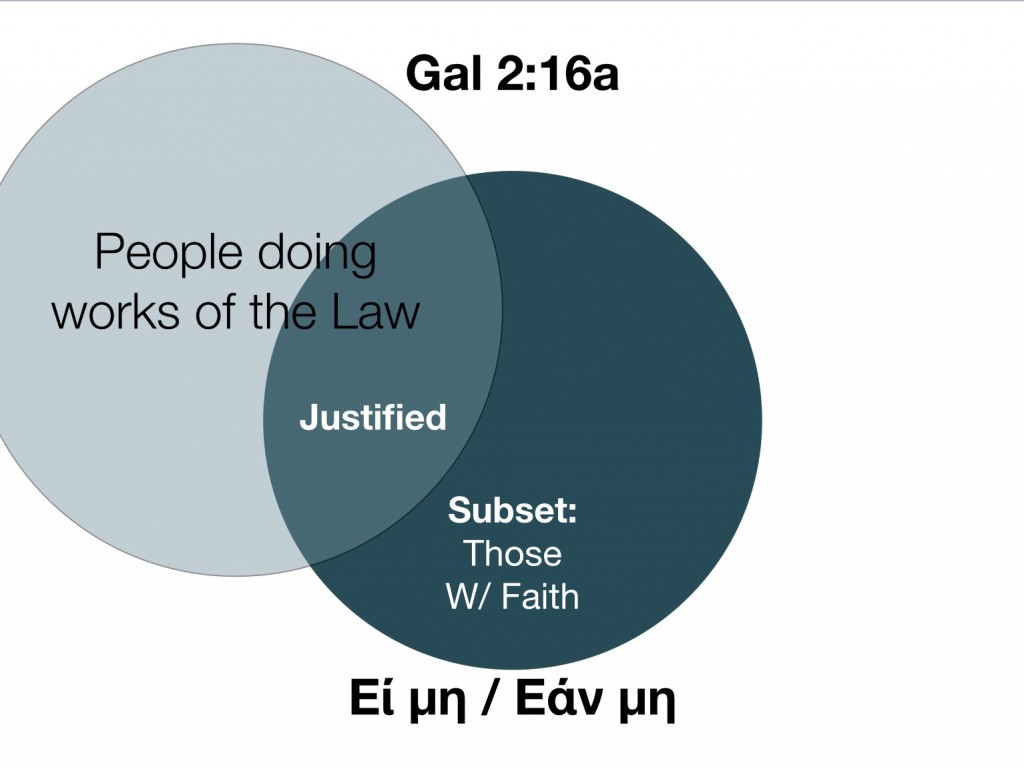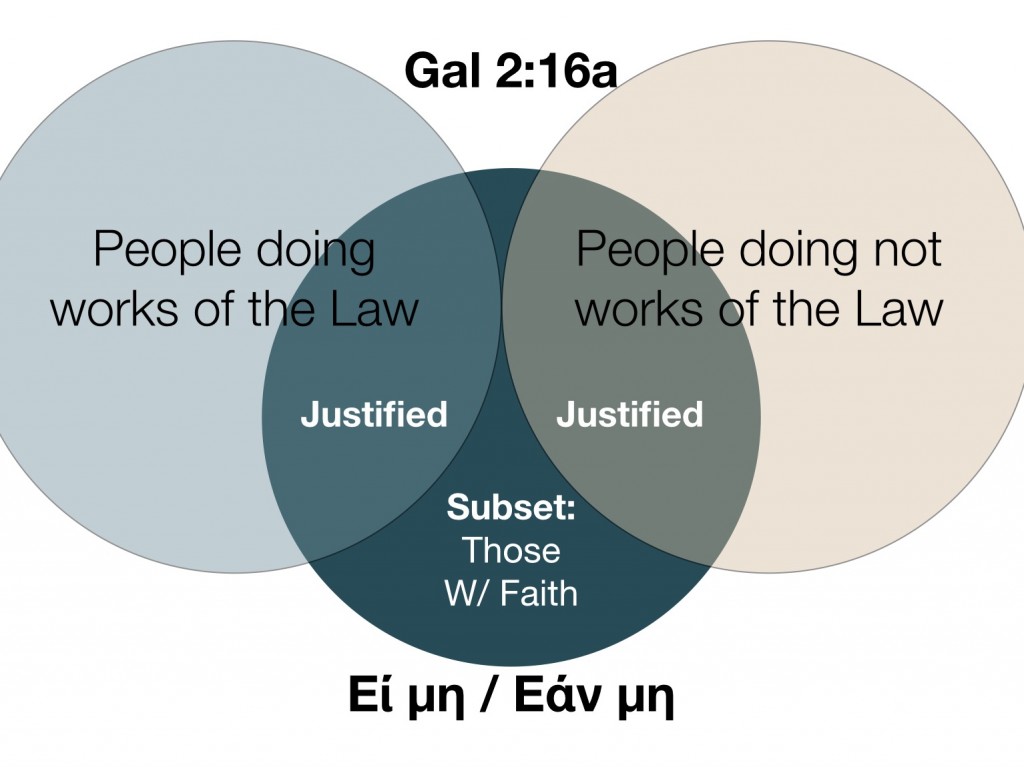 The final installment of this series on participles focuses on the practical payoff of letting Greek be Greek. What do I mean by this? Writers make rhetorical arguments that rattle our theological cages. Take a look at a literal translation of Gal 2:16a: “knowing that a person is not justified by works of the law except by faith in Jesus Christ…” This apparent theological problem is generally solved with a grammatical fix by claiming irregular or exceptional use of something.
The final installment of this series on participles focuses on the practical payoff of letting Greek be Greek. What do I mean by this? Writers make rhetorical arguments that rattle our theological cages. Take a look at a literal translation of Gal 2:16a: “knowing that a person is not justified by works of the law except by faith in Jesus Christ…” This apparent theological problem is generally solved with a grammatical fix by claiming irregular or exceptional use of something.
Most translations promote the participle of 2:16a to a main verb, and render ἐὰν μὴ as “but” instead of as an exception. This avoids contradicting Paul’s claims elsewhere that salvation is by faith in Christ alone, without works:
Galatians 2:16 “know that a person is not justified by the works of the law, but by faith in Jesus Christ. So we, too, have put our faith in Christ Jesus that we may be justified by faith in Christ and not by the works of the law, because by the works of the law no one will be justified. (NIV)
Paul’s use of a participle instead of a main verb has the effect of backgrounding the action with respect to the main clause that follows. It prioritizes the actions, signaling that the main action is more important. What could have been two main thoughts is consolidated into a primary and secondary action.
But what if Paul really meant to use a participle here instead of a main verb, and to create a real exception like ἐὰν μὴ typically indicates? What happens if we apply principles from discourse grammar and take the choices at face value? It’s not the unorthodox problem you might think. Here is a screenshot of the Lexham Discourse Greek New Testament to help illustrate what I mean:
The Logic of Paul’s Argument
This initial part of verse 16 (the grayscale text above) is backgrounded with respect to the main verb of believing. Paul’s assertion can be logically summarized like this:
X + Faith >> Justification, where X = works of the law
But we could substitute most anything else in the X position (e.g., reading my bible or something silly like drinking chocolate milk). Why? As Paul makes clear in the balance of this complex sentence, faith is the only determinative factor in justification. But from a rhetorical standpoint, including works makes it sound as though they play a meaningful role.
The reference to works also does something else: it restricts the statement about justification by faith to a specific group of people. Take a look at the diagram below:
In other words, the participial clause is only commenting on those doing works of the law, not those resting on faith alone. I could say that drinkers of chocolate milk won’t be justified except by faith in Christ Jesus and it would be true, right? Misleading, but true. In order to get the full, corrected picture, it is critically important to read this as a backgrounded participial action. It telegraphs that this clause is not the final word on the matter, just the beginning.
The participle “knowing” also characterizes the following statement as a shared assumption by Paul and the Jews referenced in the “we” of verse 15. It makes Paul sound as though he is siding with the Judaizers. It doesn’t mean that Paul has changed his claim about justification. All it does is leave the door open that works play a role in justification. But if we just read the rest of the sentence, structured as Paul indicates, we’ll see that he slams this “open door” shut. Twice, as a matter of fact.
Closing Open Doors
What is Paul’s goal for believing in Christ? The last part of the verse (the ἵνα “sub-point” in the screenshot) asserts his purpose in believing is to be justified by faith and not by works of the law. From a logical standpoint, Paul claims that:
Faith (without X) >> Justification.
So as we read the rest of what in Greek is one complex sentence, Paul clearly states that faith alone is sufficient for justification. This statement essentially introduces another group omitted from the participial clause of 2:16a, people not doing works of the law.
Clear enough, but this leaves one logical possibility unaccounted for. What about justification by works alone, without combining them with faith? The last part of v. 16 directly addresses this issue. By works of the law no flesh (of any kind) will be justified. In other words, it ain’t ever going to happen. From a logical standpoint, this means:
X (without Faith) ≠ Justification
Summary
Paul’s inclusion of works as though it played a meaningful role in justification set the stage for him to unequivocally exclude it from consideration later in the verse. It was a red herring, something that seemed relevant but turns out not to be. Logically, saying “No one is justified by doing X except by faith in Christ Jesus” is a true statement, but it creates the impression that X plays a meaningful role.
The example above illustrates the explanatory power of discourse grammar. We can respect Paul’s grammatical decisions without undermining the doctrine of justification by faith alone without reference to works, as clearly stated in passages like Rom 3:28.
Continuing the Discussion
I will host a Google Hangout later this week to dig a bit deeper into these issues and to answer questions you might have. Join or follow the Faithlife’s High Definition Bible Study group for more details about the time and how to submit questions.
If you found this explanation and these diagrams helpful, then like and share it with your fellow grammarians. I’d strongly recommend the High Definition Commentary series to you. This series is designed to address complex matters of advanced grammar and discourse analysis in plain language. It also includes graphics like these that can help you both in your own study and your communication of that to others. The Philippians and Romans volumes are available for purchase now, and the James volume is available for pre-ordering at a significant discount. And don’t forget to check back each week for the next installment of HiDef Mondays.







Dear Steve,
As a Greek teacher, I thank you so much for this. How good to see someone let Greek tweak theology, rather than the other way around.